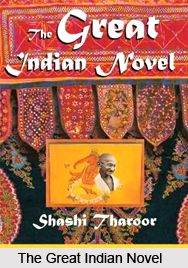 The novel "The Great Indian Novel",with its ambition, daring emotion and bold satire is a perfect emblem of the mastery of Shashi Tharoor. He beautifully enlaced the different characters of Mahabharata in the book by different name, which befits present day politics. Thus the epic retold in a stylized way. The modern scenario ideally befits the epic characters whilst justifying the title.
The novel "The Great Indian Novel",with its ambition, daring emotion and bold satire is a perfect emblem of the mastery of Shashi Tharoor. He beautifully enlaced the different characters of Mahabharata in the book by different name, which befits present day politics. Thus the epic retold in a stylized way. The modern scenario ideally befits the epic characters whilst justifying the title.
Born in London in 1956, Shashi Tharoor is a prolific writer and also UN Diplomat. He had most of his schooling and under graduation in Mumbai, Kolkata and Delhi. He completed his honors degree in History from the esteemed St. Stephen`s College, Delhi and won a scholarship to Tufts University, Boston. In the mid 1970`s, Shashi went to the United States and acquired two master`s degrees and a Ph.D. in Diplomacy from the Fletcher School of Law & Diplomacy at Tufts University. He completed his education at the age of 22 years. He was married to the journalist wife, Tillotma and has twin sons, Ishaan and Kanishk. It is remarkable that despite being out of India from such an early age, Tharoor retains a strong attachment to his Indian roots. As a journalist, Tharoor has written many articles, short stories, literary reviews and commentaries. Shashi Tharoor has explored the diversity of the Indian culture as well. He is the winner of several journalism and literary awards, including Commonwealth Writers` prize. He was named the Global Leader of Tomorrow by the World Economic forum in Davos. Mr. Tharoor is also the author of several books.
Synopsis:
With `The Great Indian Novel`, Shashi Tharoor shows us that `everything old is new again`. This novel is a re-interpretation of the Mahabharata framed in India`s struggle for independence, and the political consequence of colonization. The famous characters make their appearances under altered names, and Mr. Tharoor manages to make the Mahabharata current while making modern Indian politics somewhat understandable. The book is also very funny at times. For someone who is fascinated in India would cherish the book.
Here in this story the author recast the mahabharata in to modern India such as the story of Karna, the driver`s son, and Drona teaching the Pandava. Also the different characters of Mahabharata are playing different characters of present scenario. He also added some new characters to befit the situation. Apart from the characters from the Mahabharata, there`s also whole new cast of characters who reflect the modern world. Two names stand out in my mind. `Gaga Shah` is the story`s name for the Aga Kahn. Given the tricks of the various Aga Kahns, `Crazy Emperor` is not a bad characterization. Then there`s Zinna as Karna and `The Hacker Off` is hacking off Pakistan or `Karnistan`, etc. The author relates Mahabharata and contemporary politics in a great way. The analogies and the intertwining of both epics were brilliant as well. In this book Shashi Tharoor tries in giving an impartial and unbiased account of pre-independence politics. The characterization of Gangaji i.e. Gandhiji was realistic very much. This proves in the way he felt betrayed by his own disciples. He raises the question of what would have been the outcome if Netaji. In this novel he was allowed to play a more active role in the key period of 30`s. It also impersonates Draupadi as the soul of India itself pleading trampled on by the politicians of the likes of Duryodhan and his associates. And the end shows how the modern day politician gets away with anything.
Being published by the Arcade publishing in 1993 this `The Great Indian Novel` truly tries to explain the present scenario with the characterization of Mahabharata.
The plot of `The Great Indian Novel` is incredible. This cannot be called as the biography of the major characters in freedom struggle. This is something `the tale of India`. This is an account of the decisions and intrigues that have shaped up the country as it is today. This book has also a humorous touch and anyone of this generation won`t have the feeling of reading a history book after reading this story.













